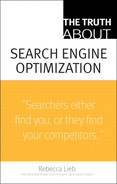Looking for a gray area in SEO? You’ve come to the right place. Perhaps no topic in organic search optimization is more debated than that of paid links. Even defining the term can be something of a toss-up.
Very broadly put, a paid link (or the practice of link buying) is paying another site to links to yours. Talk about gray—weren’t we just discussing paying Yahoo! $299 to express-include you in its directory a mere two Truths ago? That’s a link, and it’s paid, right?
Well, yes and no. Remember the adage this book keeps repeating about building websites for users, not for search engines? Search engines (Google in particular) take a dim view of buying or selling links because, in the words of Google’s Matt Cutts, “If someone is buying text links to try to rank higher on search engines, they’re already doing something intended more for search engines than for users.”
What Cutts isn’t directly saying here is that paid links also make life somewhat harder for his search engine algorithms. Hyperlinks help determine a site’s reputation. Search engines would have it easier if all links were voluntary editorial “votes”. Cutts argues on his blog that, “Selling links muddies the quality of link-based reputation and makes it harder for many search engines (not just Google) to return relevant results. When the Berkeley college newspaper has six online gambling links (three for casinos, two for poker, and one for bingo) on its front page, it’s harder for search engines to know which links can be trusted.”
Some link-buying proponents argue that although search engines can certainly make their own rules, they might also be concerned that paid links compete with their own paid contextual and search advertising programs. Search expert Chris Sherman put it rather neatly on SearchEngineLand.com: “After all, Google’s primary business model is selling links, if you think about it!”
Some have said paid links that are relevant and reviewed by humans (much as display advertising is) shouldn’t be subject to penalties levied by search engines against sites determined to support the practice. In fact, some search experts are even concerned that Google’s online form (that can be used by anyone) to report sites using paid links to boost search rankings can be abused. Competitors or those whose own sites rank below the alleged culprits can easily be targets.
Sites that Google determines are selling links improperly can lose their capability to confer the benefit of their reputation on the other sites they link to, rendering the links functional as hyperlinks, but useless where SEO is concerned.
Told you this topic was complicated!
Meanwhile, a quick search on any of the major search engines will turn up no shortage of companies eager to act as link brokers. Most pledge, of course, that their practices are fully ethical, relevant, and above-board. Some sites are known to auction links to the highest bidder. Google’s bottom line on ethical paid links is that they should contain the “nofollow” tag (discussed in Truth 28, “Putting the kibosh on link love with nofollow links”), which prevent search engine crawlers from following, and hence counting, the link.
By now, a few highly opinionated pros and cons regarding link buying should have begun to emerge, such as the following:
• Search engines frown on the practice.
• Experts disagree on how, when, under what circumstances, and even if links should be bought or sold.
• Buying just the right link may drive high-quality traffic to your site—search engines be damned!
• Buying links? That’s advertising, not organic SEO!
• You put a lot of time and effort into building links—so in a sense, you “pay” for them anyway.
• Buying links is fine so long as there’s disclosure, just as with any other form of advertising.
Clearly, buying links is no playing field for the uninformed. It’s also one of those situations in which being informed seems to hinder as much as it might help, given that buying links can offer benefits, but can also potentially penalize websites.
The best advice when buying (or selling) links is concerned is likely not to make the practice a cornerstone of any SEO initiative. There are too many, much more important areas to focus on first: relevant, optimized content; intelligent site architecture; meta data; and of course, developing and maintaining a strong, ongoing editorial linking strategy.
